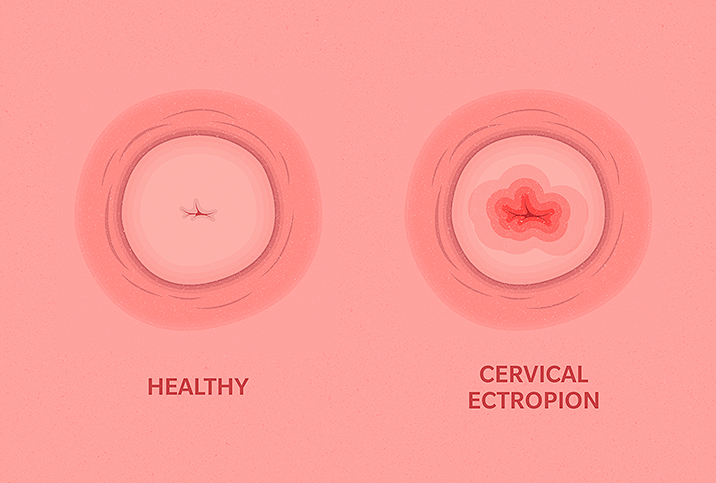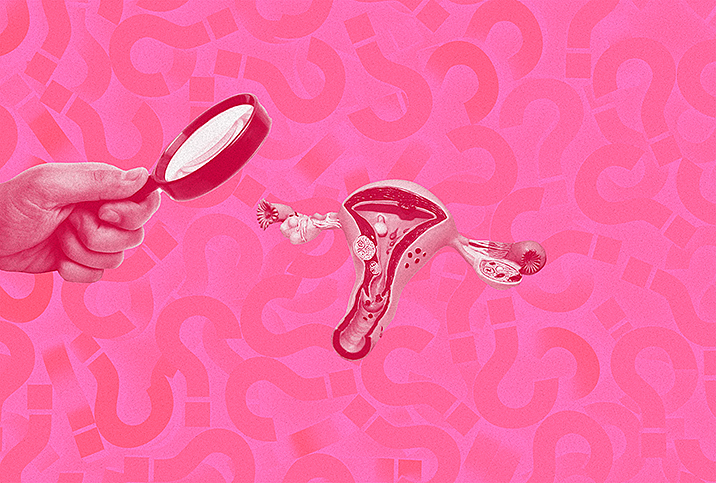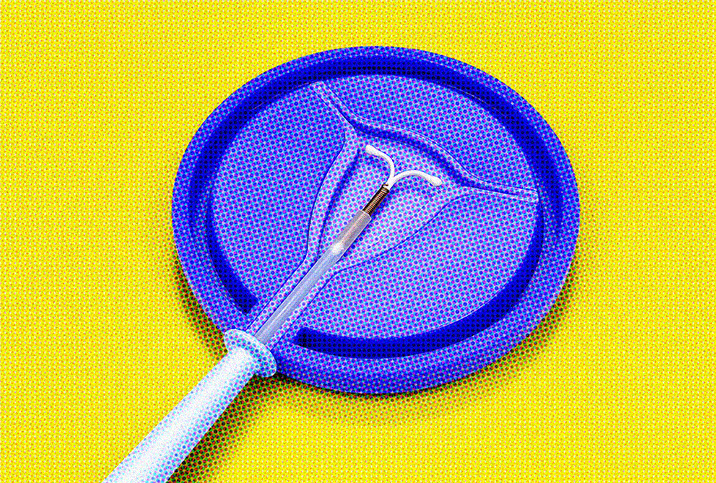What is Cervical Ectropion and How Might it Stop Your Sex Life?

After getting the Depo-Provera contraceptive injection at age 20 to quell any concerns about possible pregnancies, I started to notice frequent bleeding and bloody discharge between my periods—a reaction that regularly worsened whenever I had sex. It was only when I saw my doctor after a year of irregular bleeding that I first heard of cervical ectropion, otherwise known as cervical ectopy.
During that visit, my doctor drew a picture of a small circle to represent my cervix, then she drew another circle surrounding it to show the erosion of the cells at its entrance.
"Cervical ectropion is when the soft cells, or glandular cells, that line the inside of the cervical canal spread to the outer surface of your cervix," explained Taraneh Shirazian, MD, a board-certified OB-GYN and founder of Mommy Matters. These cells can cause bleeding irregularity, added bleeding between periods and bleeding after sex.
How may cervical ectropion stop your sex life?
Penetrative sex can exacerbate ectropion as an inserted penis or sex toy can irritate sensitive membranes and cause extra bleeding, sometimes stopping sex completely for some women. Unsurprisingly, ectropion is the most common cause of bleeding after sex, occurring in up to 25 percent of women who have the condition, according to a November 2020 study in StatPearls.
Cervical ectropion is quite common and can be easily treated. My ectropion was caused by my hormonal contraception, but Rebecca Shoosmith, head of information and support services at Jo's Cervical Cancer Trust in London, explained there are ways people can develop it.
"Many are born with it; for others, it can be caused by hormonal changes," she said, "from going through puberty, pregnancy or taking the combined contraceptive pill."
'Cervical ectropion is when the soft cells, or glandular cells, that line the inside of the cervical canal spread to the outer surface of your cervix.'
Not every case of cervical ectropion even needs to be treated—occasionally, it will just fade away on its own. However, if the condition worries you or if it continues to impact your life or take away your sex life, then it's essential to see your doctor sooner than later.
"It's not usually anything to worry about," said Shoosmith, who explained that unusual bleeding is the main symptom of ectropion, "but they can rule out anything more serious."
How can you treat cervical ectropion?
If you take a contraceptive pill, a doctor might suggest you switch to a different form of birth control to manage your ectropion symptoms, Shoosmith added. Starting a new regimen of contraceptive pills can produce a variety of unique side effects from person to person, so it might take a bit of trial and error to find the right one for you.
I changed contraception a couple of times, first switching from the injection to the pill before eventually getting fitted for a Mirena IUD instead. The lower dosage of hormones of the Mirena meant that my ectropion didn't return and I didn't have periods at all.
Despite how common it is, none of my friends or family members who I told about my cervical ectropion had heard of the condition. So I was a little surprised when a story I wrote about my diagnosis on my relatively small personal blog shot up the ranks of Google search due to there being so little information floating around about the condition. One close friend sought treatment after I told her about it. Like me, she'd just put up with the discomfort and irregular bleeding before she realized she didn't have to.
Solving cervical ectropion to take back your sex life
It is important to visit a medical professional if it is affecting your sex life as nobody should endure bloody discharge or discomfort after intercourse.
I finally went to see the gynecologist for treatment when I was in my thirties during my cervical smear test. The nurse told me my ectropion was persistent and that she struggled to obtain enough cells to send away for the Pap smear. Not only did the swab cause my cervix to bleed, but I had to go back to have the Pap test redone later on.
I underwent silver nitrate treatment for my ectropion, which works by cauterizing the cells around your cervix to stop them from bleeding. The process involves opening the cervix with a speculum and then directly treating the cells with swabs of silver nitrate. It was quick and slightly uncomfortable but not painful, and apart from silver-colored discharge and a slightly delayed period, I had no issues or any more cervical bleeding except for a tiny bit in early pregnancy more than five years later.
You can't have sex or put anything up inside your vagina for a week after the treatment, as the nitrate can burn a penis or tampon during this window. Silver nitrate isn't the only option for treatment, and the use of it depends on the severity of the cervical ectropion. The other two treatment options use heat or freezing to cauterize the area and stop it from bleeding.
Cervical ectopy is a condition that many people are expected to ignore or are simply not told about. However, it is important to visit a medical professional if it is affecting your sex life as nobody should endure bloody discharge or discomfort after intercourse. The treatment itself is quick and can be very effective.
I wish I'd had it done earlier as it would have saved years of unnecessary bleeding. At the very least, people should know what is going on with their cervix, an important part of our reproductive anatomy that deserves as much attention as the rest.


















